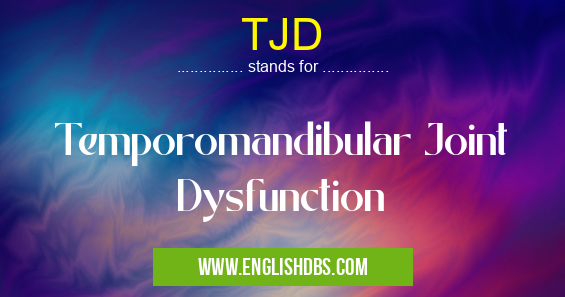What does TJD mean in UNCLASSIFIED
Temporomandibular Joint Dysfunction (TJD) is a common condition that affects the jaw joint and its surrounding muscles. It can cause a range of symptoms, including pain, clicking or popping sounds, and difficulty opening or closing the mouth.

TJD meaning in Unclassified in Miscellaneous
TJD mostly used in an acronym Unclassified in Category Miscellaneous that means Temporomandibular Joint Dysfunction
Shorthand: TJD,
Full Form: Temporomandibular Joint Dysfunction
For more information of "Temporomandibular Joint Dysfunction", see the section below.
What does TJD stand for?
TJD stands for Temporomandibular Joint Dysfunction.
What does TJD mean?
TJD refers to a group of conditions that affect the temporomandibular joint (TMJ), which is the hinge that connects the lower jaw to the skull. These conditions can cause pain, stiffness, clicking, or popping sounds in the jaw, as well as difficulty opening or closing the mouth.
Symptoms of TJD
Symptoms of TJD can vary from person to person, but some of the most common include:
- Pain: Pain in the jaw, face, or neck is a common symptom of TJD. The pain can range from mild to severe.
- Stiffness: Stiffness in the jaw can make it difficult to open or close the mouth.
- Clicking or popping sounds: Clicking or popping sounds in the jaw when opening or closing the mouth are a common symptom of TJD.
- Difficulty opening or closing the mouth: Difficulty opening or closing the mouth is another common symptom of TJD. This can make it difficult to eat, talk, or yawn.
- Headaches: Headaches are a common symptom of TJD. The headaches can be mild or severe.
Causes of TJD
The exact cause of TJD is unknown, but several factors are thought to contribute to its development, including:
- Trauma: Trauma to the jaw, such as a blow to the face, can damage the TMJ and lead to TJD.
- Overuse: Overuse of the jaw, such as from excessive chewing or grinding of the teeth, can strain the TMJ and lead to TJD.
- Stress: Stress can lead to muscle tension in the jaw, which can contribute to TJD.
- Genetics: Some people are more likely to develop TJD than others due to their genes.
Treatment for TJD
Treatment for TJD typically involves a combination of therapies, including:
- Medication: Over-the-counter pain relievers, such as ibuprofen or acetaminophen, can help to reduce pain and inflammation.
- Physical therapy: Physical therapy can help to improve range of motion in the jaw and reduce pain.
- Splints: Splints can be worn to help reposition the jaw and reduce stress on the TMJ.
- Surgery: Surgery may be necessary in some cases to correct structural problems in the TMJ.
Essential Questions and Answers on Temporomandibular Joint Dysfunction in "MISCELLANEOUS»UNFILED"
What is Temporomandibular Joint Dysfunction (TJD)?
TJD is a disorder that affects the temporomandibular joint (TMJ), the hinge that connects the lower jaw to the skull. It can cause pain, clicking, popping, or locking of the jaw, as well as headaches, earaches, and other symptoms.
What causes TJD?
The exact cause of TJD is unknown, but it is thought to be related to a combination of factors, including genetics, trauma, and overuse or misuse of the jaw. Certain conditions, such as arthritis and stress, can also contribute to TJD.
What are the symptoms of TJD?
Symptoms of TJD can vary widely, but common symptoms include:
- Jaw pain
- Clicking, popping, or locking of the jaw
- Headaches
- Earaches
- Difficulty chewing or opening the mouth
- Facial pain
- Neck pain
How is TJD diagnosed?
TJD is diagnosed through a combination of physical examination, medical history, and imaging tests. Your doctor will examine your jaw, listen for any clicking or popping sounds, and assess your range of motion. Imaging tests, such as X-rays or MRI scans, may be used to rule out other conditions and confirm the diagnosis.
What are the treatment options for TJD?
Treatment for TJD depends on the severity of the condition and the underlying cause. Conservative treatments, such as pain relievers, ice packs, and jaw exercises, can often help to relieve symptoms. In some cases, more invasive treatments, such as surgery, may be necessary.
Can TJD be prevented?
There is no sure way to prevent TJD, but there are some things you can do to reduce your risk, such as:
- Avoid chewing gum or hard candy
- Limit jaw clenching or grinding
- Use a night guard if you grind your teeth at night
- Maintain good posture
- Manage stress
Final Words: TJD is a common condition that can cause a range of symptoms, including pain, clicking or popping sounds, and difficulty opening or closing the mouth. Treatment for TJD typically involves a combination of therapies, including medication, physical therapy, splints, and surgery.
